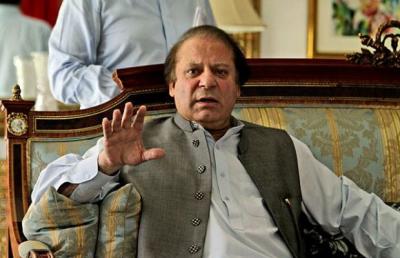By PTI
NEW DELHI: As Pakistan prime minister, Nawaz Sharif made unilateral concessions to his Indian counterpart Narendra Modi and even weakened Islamabad’s principled position on Jammu and Kashmir, thinking that he would extract something in return but that did not happen, a former Pakistani diplomat said on Tuesday.
Pakistan’s former high commissioner to India Abdul Basit, in an online interview to Karan Thapar of The Wire, severely criticised Sharif on his policy towards India and said Islamabad’s reading of Prime Minister Modi was “off the mark”.
Following an invitation, Sharif had attended Modi inauguration as prime minister in 2014, signalling his intent to improve ties with India.
On his part, Modi had made a surprise stopover at Lahore in December 2015.
However, a series of terror attacks on India by Pakistan-based terror groups in 2016 brought the ties under severe strain.
Basit, referring to a meeting between Sharif had with Modi when he visited India in 2014, said the Pakistani leader kept silent on Kashmir and did not utter a single word on it when the Indian prime minister raised the issue of terrorism and Mumbai terror attack trial.
“He (Sharif) thought that by making such concessions he would eventually be able to get concessions from prime minister Modi. But that was not the case in my view. Because the way Islamabad was reading PM Modi in my assessment was off the mark,” Basit said.
He said Sharif wanted to maintain good relations with Modi but did so unilaterally without anything in return.
Asked on what ground, he accused Sharif of ‘pandering to India unilaterally and unconditionally’ in his new book, Basit said: “I watched our leader very very closely and worked with him very closely on Pakistan-India relations. I make these assumptions based on what I have seen.”
Basit was Pakistan’s envoy to India from 2014-2017, the first three years of the Modi government.
When asked whether Pakistan’s concessions to India meant its interests were compromised as Modi did not offer anything in return, the former high commissioner said, “That is correct and (it) weakened our principled position on Jammu and Kashmir in particular.”
The former envoy also said that the joint statement of December 2015 and the Ufa joint statement were poorly negotiated by Pakistan and they made concessions to India.
Basit said Sharif had an emotional attachment to India and Indians which, at times went beyond his stature as the prime minister.
He said Sharif would meet almost any Indian who wanted to see him and added he was “out to oblige everyone”.
Basit also criticised Sharif’s foreign affairs advisors, Sartaj Aziz and Tariq Fatemi saying they were too keen on extending concessions to India rather than standing up for Pakistan’s interests.
To a question on his criticism of the high-ranking officials, the former envoy said “The way we handled our interaction with India subsequently and it was not because of the prime minister himself.
I think the entire team, I do not know whether that kind of instructions they had from the prime minister.
“But since he (Sharif) was at the helm, I would say that he was kind of convinced that he would eventually extract some concessions from India which he failed to do unfortunately.”
Basit also indicated how he was repeatedly ignored on important India-Pakistan matters.

